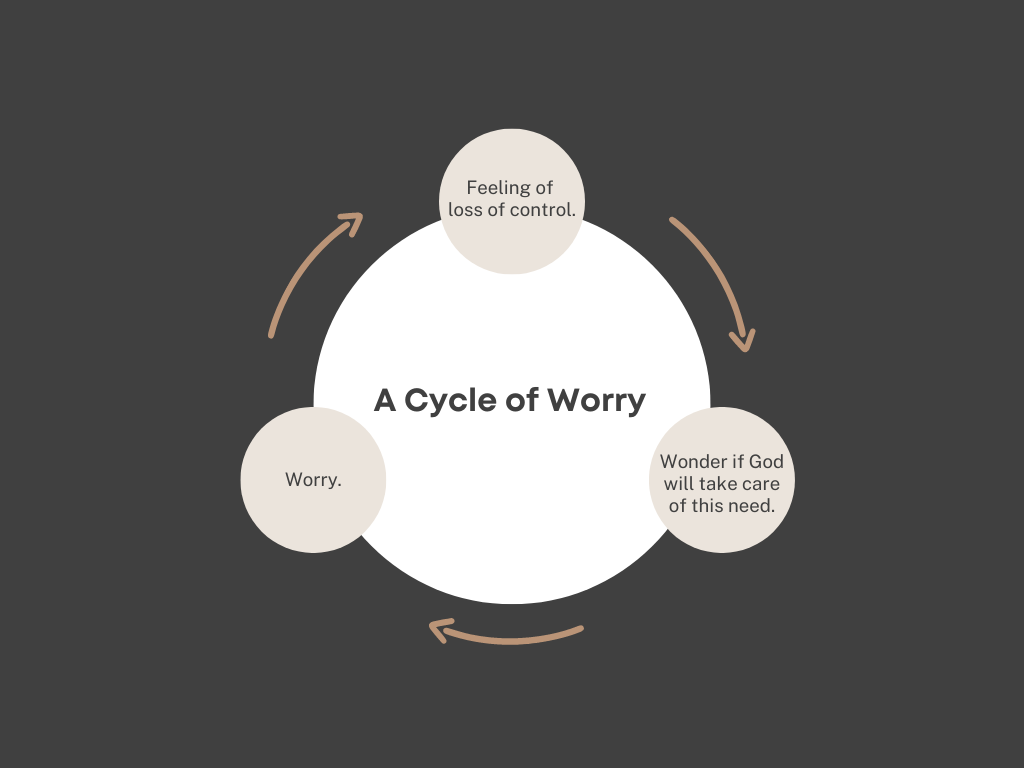Our focus scripture for how to deal with worry in a biblical way is Philippians 4:5-6.
Philippians 4:5-6 says, “Rejoice in the Lord always; again I will say, rejoice. Let your gentleness be known to everyone. The Lord is at hand; do not be anxious about anything, but in everything by prayer and supplication with thanksgiving let your requests be made known to God.”
The Bible provides guidance and comfort for believers facing worry and fear. In 1 Peter 5:7, we are encouraged to cast all our anxieties on God because He cares for us. This brief Bible study explores the concept of casting our worries on God and offers insights into dealing with anxiety in a biblical way.
WATCH THE VIDEO BELOW BEFORE READING THE FULL BIBLE STUDY ON WORRY
The video will provide practical ways we physically experience worry and provide even more understanding of how to process and handle worry.
Trusting God with Our Worries
To cast our worries on God, we must first establish trust in Him. Just as we wouldn’t confide in someone we don’t know, we may hesitate to share our burdens with God. We may question whether He truly cares about us and our struggles. Therefore, developing a sense of safety and trust in God is crucial.
The Nature of Anxiety and Worry
Anxiety often arises from cognitive dissonance—a conflict between our beliefs and actions. When our behavior contradicts our values or when we face uncertainty, anxiety emerges.
If you are anxious, somewhere inside, you are arguing with yourself. If you can figure out the argument, then you can allow God to have the last word. However, the thoughts that divide us and distract us also feel scary.
Worry is, at its root, an attempt to control the world around us. We have the illusions that we can control things that are, in truth, outside our control. Paul invites us to choose a mentality that is true, and recognize that God is the one that is in charge. Accordingly, instead of trying to control things by worrying, Paul tells us but in everything by prayer and supplication with thanksgiving, let your requests be made known to God.
When we choose the mindset that God knows what is best for us and will do what is best, then we are promised the peace of God. When we trust beyond our comprehension that God is good, and has our best interest at heart, even when we cannot conceive how good can come from a terrible circumstance, then we get a peace that also surpasses all comprehension.
Recognizing the Secondary Nature of Anxiety
Anxiety is considered a secondary emotion that arises from violated love or trust. It may make us feel helpless, powerless, or inadequate. Therefore, I consider anxiety a secondary emotion. Another word for that might be more of a reaction than a feeling or a primary emotion. Pain can come from two different directions – a violation of love which tells us who we are, and a violation of trust which makes us feel unsafe. So we might feel helpless and powerless, or we might feel like we’re unable to measure up to expectations, that we’re inadequate, or that we’re not good enough for the task we’re being asked to do.
This is what I see probably most often with worry – our brain starts trying to help us out by controlling more than we’re able to by overthinking it and worrying about it. And usually, that’s a sign that we’ve stepped beyond what we’re empowered to do, beyond what we have agency over and choices in, and we’re starting to worry about it because we’re in territory that we don’t have any control over.
Agency is the ability God gave us to be able to act, choose, and decide for ourselves. In other words, it is our free will. God created every human being with free will. This means we can choose, decide, and believe what we want. Free will is a privilege that we must use for good.
I think a huge component when we feel unsafe or when we feel helpless or powerless is being able to say, “Okay, I may not be able to control the entirety of this situation, I may not even be able to control very much of it, but I am a human being who is empowered to make choices.” I can narrate this situation for myself. Therefore, be aware of the choices we have and be aware of what we would love to control and can’t.
Identifying Choices and Surrendering Control
To address worry effectively, it is helpful to engage in a journal exercise. By drawing two circles, we can brainstorm the choices we have and the things we would like to control but cannot. Through prayer, we can surrender the latter to God, knowing that we can trust Him with all the aspects of life beyond our control. By focusing our energy on the choices we can make, we align ourselves with God’s guidance.
Understanding Worry and Responding Biblically
Worry and anxiety can hijack our minds and trigger the fear response. This response often impedes our ability to reason and find solutions. In Philippians 4:5-6, Paul encourages believers to rejoice in the Lord, exhibit gentleness, and not be anxious about anything, “Rejoice in the Lord always; again I will say, rejoice. Let your gentleness be known to everyone. The Lord is at hand; do not be anxious about anything, but in everything by prayer and supplication with thanksgiving let your requests be made known to God.”
He advises them to bring their requests to God through prayer, supplication, and thanksgiving.
Exploring Greek terms in this passage:
- Merimnao (3309): This Greek word denotes worry and anxiety, representing a divided, distracted state of mind. It reflects the inner turmoil caused by anxiety and the fragmentation it brings to a person’s being.
- Merimna (3308): Derived from merizo (to divide), this term signifies worry as a state of being divided or fractured. It emphasizes the detrimental effects of worry on an individual.
- Proseuchomai (4336): This word for prayer implies interacting with the Lord, exchanging human wishes for His divine wishes. It involves heartfelt communication and seeking divine persuasion.
- Deesis (1162): Closely related to the Greek word for lack or want, this term refers to a sincere and urgent petition that arises from a personal need.
More commentary on this verse to get a better understanding. This is a command for us not to be anxious about anything. How do we do that? This verse goes on to explain that we are supposed to take our needs and problems to the Lord in prayer. Anxious people are people who haven’t thrown their problems over on the Lord in prayer.
Notice that all our supplications are supposed to be made with thanksgiving. That’s very important. Sometimes people just tell the Lord all their problems and call that prayer. That’s complaining. But when we voice our needs to the Lord and wrap them in thanksgiving, that moves us over into the realm of faith. If there isn’t thanksgiving in every prayer we pray, then we aren’t abounding in faith (Colossians 2:7).
Paul said we were to give thanks when we make our requests to God. A request is something asked for but not yet received. We wouldn’t request something to happen that has already happened. So we are supposed to thank the Lord for doing things before He does them. That’s what the Bible calls faith.
Notice we are supposed to use prayer and supplication. Many people only think of prayer as supplication, i.e., asking for something. But the Greek word “PROSEUCHE,” translated as “prayer” in this verse, means “prayer (worship)” (Strong’s Concordance). This is saying we need to be praising the Lord, which moves us into faith and then make our supplication to the Lord.
Dealing with Worry in a Biblical Way
Acknowledge God’s Care: Remind yourself that God cares for you and is concerned about your well-being. Trust in His love and faithfulness to guide you through challenging times.
Identify the Source of Worry: Reflect on the root causes of your worry. Is it a result of feeling out of control, inadequate, or uncertain? Understanding the underlying reasons can help you address them from a biblical perspective.
Develop Trust and Surrender: Cultivate a deep trust in God’s sovereignty and wisdom. Surrender your worries and anxieties to Him, knowing that He is in control and has your best interests at heart. Surrendering involves acknowledging that some things are beyond your control and choosing to place them in God’s hands.
Prayer and Supplication: Engage in regular prayer and supplication. Take your concerns, fears, and worries before God in honest and heartfelt communication. Express your needs, desires, and uncertainties, and seek His guidance, wisdom, and peace. Remember to include thanksgiving, acknowledging God’s faithfulness and provision.
Focus on God’s Promises: Meditate on God’s promises found in Scripture. Remind yourself of His faithfulness, love, and provision in the past. Allow His promises to strengthen your faith and provide reassurance in the face of worry.
Choose a Biblical Mindset: Fill your mind with thoughts that align with God’s truth. Replace anxious thoughts with truths from God’s Word. Focus on God’s goodness, His sovereignty, and His ability to work all things together for your good.
Practice Gratitude: Cultivate an attitude of gratitude. Regularly thank God for His blessings and provision. Gratitude helps shift your focus away from worry and redirects it toward recognizing God’s faithfulness and goodness.
Seek Wise Counsel: If your worries persist or become overwhelming, consider seeking guidance from trusted mentors, pastors, or counselors who can provide biblical insight and support.
5 Questions to Ask Yourself When Dealing with Worry
How does understanding God’s care for us impact our ability to cast our worries on Him?
What is the relationship between anxiety and cognitive dissonance? How can recognizing this help us address our worries?
In what ways can we surrender control to God when faced with worries and anxieties?
How do prayer and supplication help us deal with worry in a biblical way? What role does thanksgiving play in this process?
How can cultivating a mindset focused on God’s promises and gratitude help us overcome worry and experience His peace?
Learn more about the Spiritual Growth Mentorship here!
Follow me on Instagram and message me!





Thank sooooo much for this heartfelt lessons on Worry, I have been truly blessed and help. PRAYER: Lord forgive me, help me to do better I confess that I have sin and come so short thank you for this time to reflect over things I have no control over, I release them now. to you, Father thank you for hearing and answering my prayer Amen 🙌
I’m so glad it resonated with you!